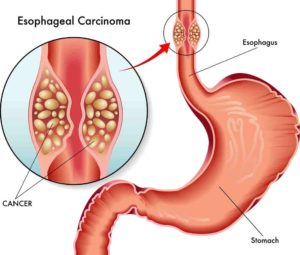Consider non-toxic esophageal cancer therapies.
Prognosis for esophageal cancer patients depends on the stage of the cancer at diagnosis of course but as the explaination below states, diagnosis is often late and therefore the five-year average survival rate is between 13-18%.

A diagnosis of esophageal cancer is not to be taken lightly. My experience as a long-term survivor of a different cancer is that newly diagnosed cancer patients usually follow standard-of-care protocols without considering what is outside the conventional oncology box.
Unfortunately the SOC for esophageal cancer causes a host of short, long-term and late stage side effects.
According to the study below, curcumin inhibits the growth of EC. Further, resveratrol and Pterostilbene also inhibit the growth of EC and are non-toxic esophageal cancer therapies.
What are some non-toxic therapies for esophageal cancer?
- Nutritional Support: Ensuring proper nutrition is essential for individuals with esophageal cancer, especially if swallowing difficulties or appetite loss occur. Working with a registered dietitian can help develop a personalized nutrition plan that addresses nutritional needs and helps maintain strength and energy.
- Acupuncture: Acupuncture is a traditional Chinese medicine practice that involves inserting thin needles into specific points on the body to stimulate energy flow. Some studies suggest that acupuncture may help alleviate symptoms such as pain, nausea, and fatigue in cancer patients.
- Mindfulness and Meditation: Mindfulness-based practices, such as meditation and deep breathing exercises, can help reduce stress, anxiety, and depression in cancer patients. These practices promote relaxation and emotional well-being, which can positively impact overall quality of life.
- Yoga and Tai Chi: Yoga and Tai Chi are mind-body practices that incorporate gentle movements, breathing exercises, and meditation. These practices can help improve flexibility, strength, balance, and mental clarity. Additionally, they may help reduce stress and improve sleep quality.
- Massage Therapy: Massage therapy involves applying pressure and manipulation to the body’s soft tissues. It can help relieve muscle tension, reduce pain, and promote relaxation. Massage therapy may also improve circulation and lymphatic drainage, which can be beneficial for individuals with cancer.
- Herbal Supplements: Some herbal supplements may have potential benefits for individuals with esophageal cancer. However, it’s important to consult with a healthcare provider before taking any supplements, as they may interact with cancer treatments or other medications.
- Supportive Therapy: Supportive therapies such as counseling, support groups, and psychotherapy can help individuals cope with the emotional and psychological challenges of cancer diagnosis and treatment. These therapies provide a safe space to express feelings, receive support, and learn coping strategies.
I am both a cancer survivor and cancer coach. I have lived in complete remission from my “incurable” cancer called multiple myeloma by living an evidence-based, non-toxic anti-MM lifestyle.
Have you been diagnosed with EC? If so, what stage? Let me know if you have any questions.
thanks
David Emerson
- Cancer Survivor
- Cancer Coach
- Director PeopleBeatingCancer
To Learn More about esphophageal cancer read the linked posts below-
“Esophageal cancer is cancer arising from the esophagus—the food pipe that runs between the throat and the stomach.[2]Symptoms often include difficulty in swallowing and weight loss.[1] Other symptoms may include pain when swallowing, a hoarse voice, enlarged lymph nodes (“glands”) around the collarbone, a dry cough, and possibly coughing up or vomiting blood.[1]
Outcomes are related to the extent of the disease and other medical conditions, but generally tend to be fairly poor, as diagnosis is often late.[2][13]Five-year survival rates are around 13% to 18%.[1][6]“
“EC is the eighth most common occurring cancer type worldwide and 6th most common among the cancer related deaths of which the most common type is squamous cell carcinoma which comprise about 90% of EC cases.
The standard of care for EC is neoadjuvant concurrent chemotherapy and radiation (NACRT) followed by surgery however the prognosis remains dismal with 5 year survival a meager 10-15%.
The treatment modalities for EC is associated with both long-term and short term toxicities. Curcumin has been explored as a therapeutic modality as a chemo adjuvant in different cancers due to its low toxicity profile and potent anticancer effect however despite lot of promising preclinical data it has not progressed from bench side to bed side.
The primary reason that has obstructed its application in clinic has been its low bioavailability which was seen in different clinical trials but there has been tremendous progress in developing formulations of curcumin which have significantly increased its bioavailability and are being tested in clinical trials.
EC is associated with inflammation that’s why curcumin being a natural antioxidant offer a potential avenue to reduce toxicity of current therapeutic modalities in a chemo adjuvant setting while simultaneously targeting different pro oncogenic pathways…”
“Background-Curcumin inhibits the growth of EC cell lines; however, the mechanism of action is not well understood. It is becoming increasingly clear that aberrant activation of Notch signaling has been associated with the development of EC. Here, we have determined that curcumin inhibits EC growth via a mechanism mediated through the Notch signaling pathway…
In this study, we show that curcumin treatment resulted in a dose and time dependent inhibition of proliferation and colony formation in EC cell lines. Furthermore, curcumin treatment induced apoptosis through caspase 3 activation, confirmed by an increase in the ratio of Bax to Bcl2. Cell cycle analysis demonstrated that curcumin treatment induced cell death and down regulated cyclin D1 levels…
Conclusion-Curcumin is a potent inhibitor of EC growth that targets the Notch-1 activating γ-secretase complex proteins. These data suggest that Notch signaling inhibition is a novel mechanism of action for curcumin during therapeutic intervention in EC…
APPIP ERROR: amazonproducts[
AccessDeniedAwsUsers|The Access Key Id AKIAJAJ37JVNL7OUU4CA is not enabled for accessing this version of Product Advertising API. Please migrate your credentials as referred here https://webservices.amazon.com/paapi5/documentation/migrating-your-product-advertising-api-account-from-your-aws-account.html.
]




